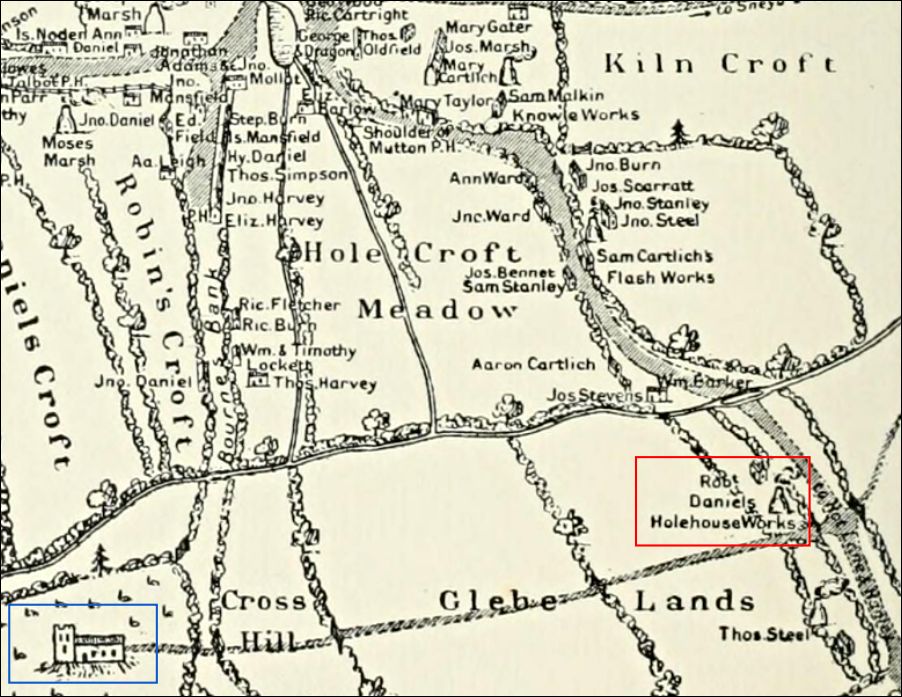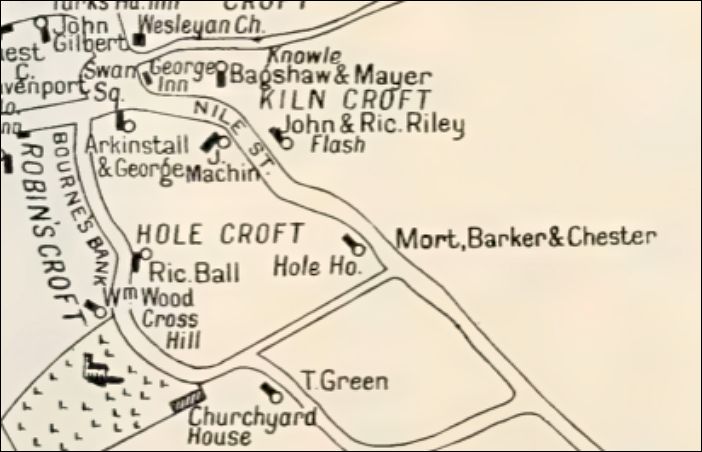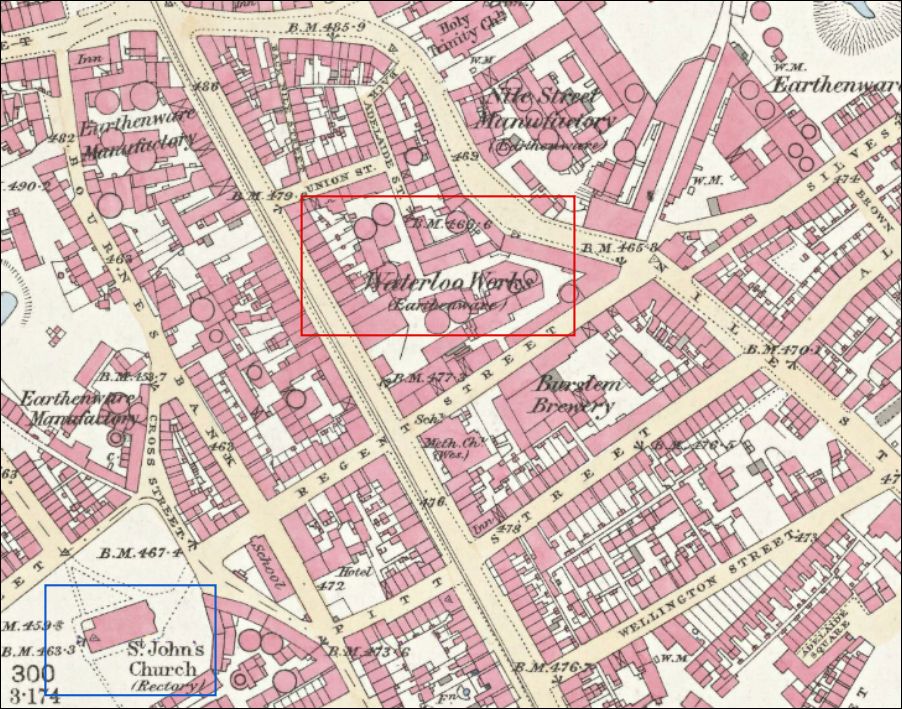![]()
Waterloo Potteries, Burslem
Note:
"Waterloo Road Works, established in 1820 (on the site of a very old pottery "on Bournes Bank" afterwards worked by William Harrison) by Mr. Thomas Hughes (grandfather of the present owner), and carried on by him and his successors, Stephen Hughes & Co., till about 1856, since which time they have been continued solely by the present Mr. Thomas Hughes, by whom the whole place has been enlarged, improved, and modernised. The manufactory is now considered to- be one of the best arranged in the town." (Jewitt pp 289-90)
There was another pottery manufactory called the Waterloo Works that were "..established about 1846 by Mr. James Vernon.." (Jewitt p 282)
| From | To | Occupier | Comments |
| late 1700's | Walter Daniel | "These works were carried on in the latter part of the eighteenth century by Walter Daniel.." | |
| Timothy and John Lockett | Manufacturing principally Salt glaze ware. | ||
| c.1802 | Joseph Machin | Joseph Machin of Burslem was the progenitor of the Machins of the Hole House Works | |
| 1809 | 1831 | Joseph Machin / Jacob Baggaley |
Manufacturing china
and earthenware. In 1831 Joseph Machin died and was succeeded by his son, William Machin and partners. |
| 1831 | William Machin and Partners. | In 1833 William Wainwright Potts joined William Machin as a partner. | |
| Richard Daniel | |||
| Thomas Edwards | |||
| 1850 | 1863? | T & R Boote |
|
Waterloo Potteries These works were carried on in the latter part of the eighteenth century by Walter Daniel, who was succeeded by Timothy and John Lockett, the manufacture at that time being principally salt-glazed ware. About 1809, the premises were purchased by Joseph Machin and Jacob Baggaley, and carried on by them for the making of china and ordinary earthenware. In 1831, Mr. Machin died and was succeeded by his son, William Machin and partners. The works next passed into the hands of Richard Daniel, next to Thomas Edwards, and in 1850 were purchased by T. & R. Boote. In 1853, Messrs. Boote took out a patent for 'Certain improvements in pottery and mosaic work'.. Jewitt's Ceramic Art of Great Britain 1800-1900; Revised by Geoffrey A. Godden, p.10
Joseph Machin of Burslem was the progenitor of the Machins of the Hole House Works, afterwards, in 1843, "Machin and Potts" of the Waterloo Works. This firm were the first successful manufacturers of porcelain in Burslem and they invented too the present method of printing the transfer papers from revolving steel cylinders, thereby greatly accelerating the work of producing these transfers and printing the ware. p.143-4
Referencing an 1818 directory by W. Parson and T. Bradshaw.... Machin & Baggaley, Low Street Joseph Machin, Waterloo Road The trades of that day dependent on potting were: Makers of the crates wherein to pack the ware; gilders; cobalt-refiners and colour-makers,
of whom Machin and Bagguley of the new "Waterloo" Road were perhaps the most important; enamellers; engravers of designs on copper, from which the transfer prints for the under-glaze blue printing were made; flint-grinders; lead and litharge makers for the glaze; saggar makers; lathe makers and lawn manufacturers.
p.156 |
|
The works of Machin and Potts [c.1834-37], formerly Machin and Baggaley [c.1818-33], and now styled the Waterloo- Pottery, in the Hole-house, and Waterloo-road, are the oldest existing establishment for the manufacturing of porcelain in Burslem. Machin & Co. have, within a few years past [in September 1831], introduced a patent process for printing china and earthenware by machinery, the paper impressions being thrown off from steel cylinders, each engraved with the required pattern, in rapid and almost endless succession, ready for the transferrers' hands. Mr. Potts has also obtained [December 1835] a patent for printing the biscuit wares in various colours at the same time ; and, besides this, the proprietors, through the ingenuity and aid of their manager, Mr. William Bourne, have lately brought an important application of the same principles to the ornamenting of paper, and japanned tea-trays, oil-cloths, table-covers, and all articles of prepared canvass, leather, &c., surpassing, we believe, every former attempt at transferring pictorial designs to such kinds of goods. This invention is likewise secured by patent. The Borough of Stoke-upon-Trent; Ward John, 1843 p.265 Dates given in brackets are those added by Geoffrey A. Godden in his book British Pottery & Porcelain 1780-1850. |
|
Joseph Machin A short distance below (the Wesleyan Chapel), at the end of the Waterloo Road, is a Residence, as unassuming in its appearance, as is its deservedly respected proprietor, Joseph Machin, Esq. one of the most early enamellers, and for some time a manufacturer of Porcelain and Pottery. During a long period he has been a member, and for many years Steward, and principal supporter, of the Wesleyan Methodist Society in Burslem. We do not recollect having heard a whisper of any kind to his discredit; but the general voice is in his praise. The influence of his piety, as well as the sincerity of his religious profession, have been constantly manifested in the blameless tenor of his transactions as a tradesman, his candour and benevolence as a friend, and his liberality towards every institution designed to ameliorate the condition of mankind. One of his Sons, who resides near, appears to emulate all the virtues of his worthy parent. The other is of much promise as a first rate artist. 'History of the Staffordshire Potteries'; Simeon Shaw, 1829, p. 32 |
| Waterloo Road, named to to
commemorate the "famous victory" was started in 1815 and
completed in 1817.
Machin Jos. & Co. Nile st, Burslem - earthenware manufacturers Pigot & Co 1828/9 directory
|

Burslem in 1750
Based on a plan by Enoch Wood

Burslem in 1800

surveyed 1865-77
Published c. 1881
questions/comments/contributions? email: Steve Birks